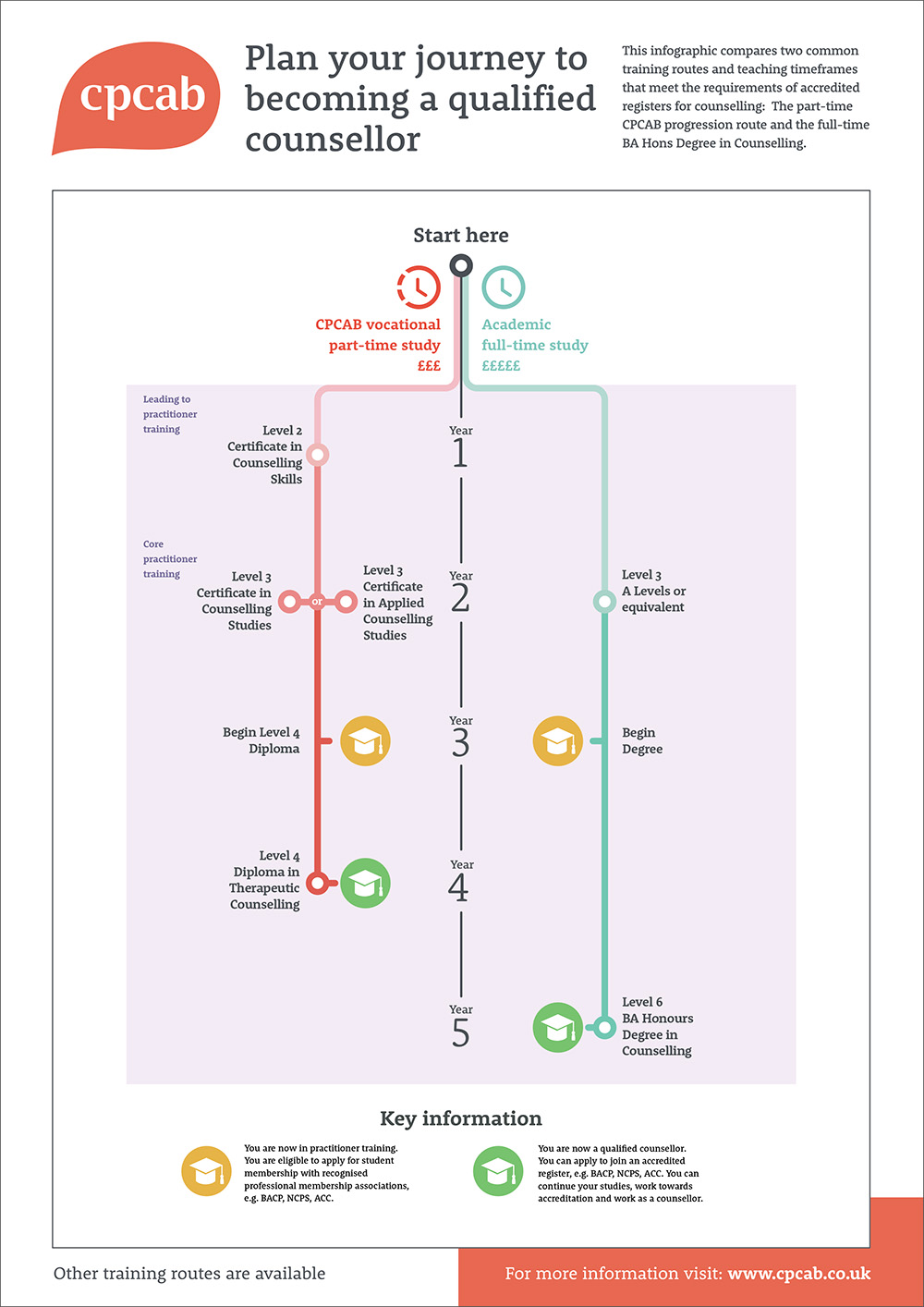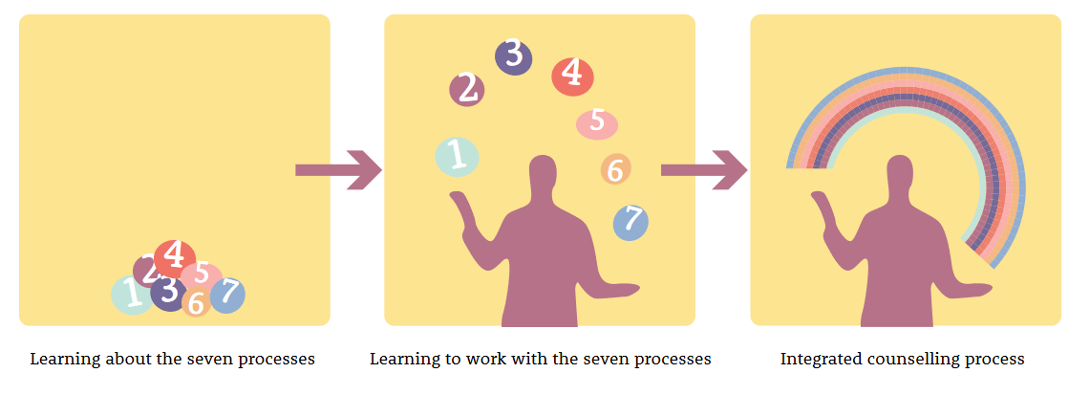Starting counselling training
Undertaking counselling training is a transformative, exciting journey. If you’ve decided that you’d like to start a counselling training course, the first decision is, which course? And then, where? The variety of courses on offer is a minefield. For the purposes of this blog we will focus on the UK.
If you’re not sure whether you’re ready to start training, read our blog: Could I become a counsellor? Or attend one of our Free online taster sessions.
Choosing a centre
When deciding where to study you will probably be led by geography, especially if you want to go all the way to Diploma level. However here are some suggestions to consider:
- Referrals – you might have a friend who has done some counselling training and can advise on where they studied and what their experience was.
- Check the websites of professional bodies such as BACP, CPCAB, or UKCP and choose a recognised training centre.
- Check the reviews. How long has the centre been going? Are the reviews recent?
- Use Google or social media to find a centre near you (online training can only get you so far). Be aware that websites that appear as ‘Sponsored’ have paid to appear at the top of the list. Google has no responsibility for showing you the best places.
- Once you have found a suitable centre look at course provision/duration/cost/placement requirements/qualification body. Will the centre be able to take you right through to diploma level? Do they provide student placements? Are their tutors all registered with BACP or UKCP? Can you visit and have a chat with someone?
Choosing a course
When considering a counselling course, you will likely be guided by the centre you have chosen. It's important to consider the course accreditation status, course content, practical experience opportunities, and career outcomes associated with each program to find the best fit for your goals and interests. Make sure you start at the right level for you. If you are beyond starter level but looking for further training remember that some course qualifications are not transferrable to different centres.
You will of course also need to consider pricing and whether the timetable on offer works for you. Online learning can be appealing if you want to save time and access a larger range of centres.
BACP has a useful page here which covers these considerations thoroughly: https://www.bacp.co.uk/careers/careers-in-counselling/training/
What about online courses?
Make sure that online courses are not pre-recorded or the hours you put in may not be recognised. Online training must always be classroom based (face to face or remote) and live ‘synchronous’ based teaching.
The course structures
The CPCAB is the most recognised awarding body in the UK for counsellors and has published a handy infographic which sets out the time each level takes.

You may find our own pathway chart useful to help navigate your way through the course progression at Redlands.
Course Levels
INTRODUCTORY
There are a number of introductory short courses available, such as our Free Taster or our One Day Short Course and these are an ideal way to discover if counselling training is for you. Many centres offer introductory lessons which give you a feel for the quality of the training provision.
PRE-QUALIFICATION (Level 2 & Level 3)
Certificate in Counselling Skills: These courses provide foundational knowledge and skills in counselling techniques and theories. They are required before you can progress to Level 4. Courses each take 1 year to complete. Some courses are free and stand-alone and do not count towards a qualification. For example NCFE Free Online Counselling Course with Certificate - Free Courses in England These courses do not count if you wish to progress to Level 4.
QUALIFICATION (Level 4)
Diploma in Counselling/Psychotherapy: Undergraduate degrees or diplomas in counselling or psychotherapy offer a more comprehensive understanding of counselling theories, techniques, and ethics. These programs often include practical placements to gain real-world experience. This is the level at which you start practicing what you have learnt. Courses typically last 2 years.

POST QUALIFICATION (Levels 5 & 6)
Advanced Diploma/Master's Degree in Counselling/Psychotherapy: These programs provide advanced training in counselling theory, practice, and research. They require a diploma or bachelor's degree as a prerequisite and may lead to professional accreditation with organizations like the British Association for Counselling and Psychotherapy (BACP) or the UK Council for Psychotherapy (UKCP).
Specialist counselling courses: There are specialized courses focusing on specific areas such as addiction counselling, bereavement counselling, marriage and family therapy, etc. These courses provide in-depth training tailored to specific client populations or issues.
Counselling Psychology Doctorate (DCounsPsy or DCouns): These are doctoral-level programs that train students to become counselling psychologists. They combine advanced coursework with supervised clinical practice and research, leading to professional accreditation as a counselling psychologist.
Continuing Professional Development (CPD) Courses: These are short-term courses designed for practicing counsellors and supervisors to update their skills, learn new techniques, or specialize in specific areas. To practice ethically as a counsellor you must continue your studies in this way.
The personal impact and looking after you
Learning to become a counsellor does not only involve learning skills and theories. It involves applying your personality to your training and practice. A part of the training will be group therapy, where participants are invited to give and receive feedback from their peers. It can be tough to hear what people think of you, and to face up to your issues in a measured way. Proper training will be carried out in a supported and supervised environment to ensure that every student is coping and benefiting from the experience. In a reputable school unsuitable candidates should be screened out at the application stage and would not be allowed to progress to the next level if their tutor felt they were not ready.
Will I change?
You may feel that you are changing as you progress through the levels, and relationships can be challenged as you grow into your new form. The Wiley library has some interesting research on the impact of counselling training on relationships : Will I change : The perceived impact of counselling training on students' personal relationships (wiley.com)
Overall though, the training is exhilarating, and we find that most people love discovering more about the topic. They will learn a lot about themselves and others and discover new strengths that enable effective communication. Over 85% of our students from Level 2 go on to study Level 3.
Join Us
Embark on a journey of self-discovery and growth as you explore the transformative power of counselling. Enrol in our CPCAB Level 2 Counselling Course to take the first step towards unlocking your potential as a compassionate and effective helper in the lives of others.
If you have any further questions we’d be delighted to help. Just fill in our contact form, email us at training@redlandscounselling.co.uk or call us on 01202 859354
